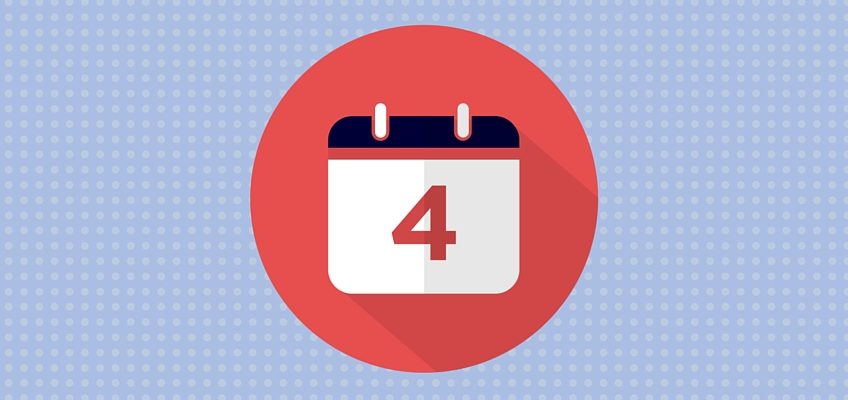A calendar, what’s the best way to use it?
Sometimes I don’t even know what day it is.
I use my phone to remind me of the date when I’m writing checks (yes, I still write checks).
I check the date on my laptop when I need to know.
My emails date themselves!
Most of the time, I just don’t worry about it.
Have computers and mobile phones made calendars obsolete?
Why do we even need calendars? Are they just a reminder of whether we go to work today or not? I work from home.
Where did they come from? Are they simple and helpful?
Let’s try to answer some of these questions.
So, What is the Best Way to Use a Calendar?
Wall Calendars
While wall calendars are tried and true, I tend to go between keeping up with nothing on a wall calendar to writing so much on it that it becomes useless.
Is there a strategy, to keep up with dates, that works best? Yet, I love the nostalgic value of wall calendars. The information on some of them could fill a book. The pictures are always beautiful. Maybe they are best used to keep up with major events.
Google Calendar
In 2017 Google updated its computer Calendar. Below is a picture of the old Google computer Calendar in the “Schedule” view:
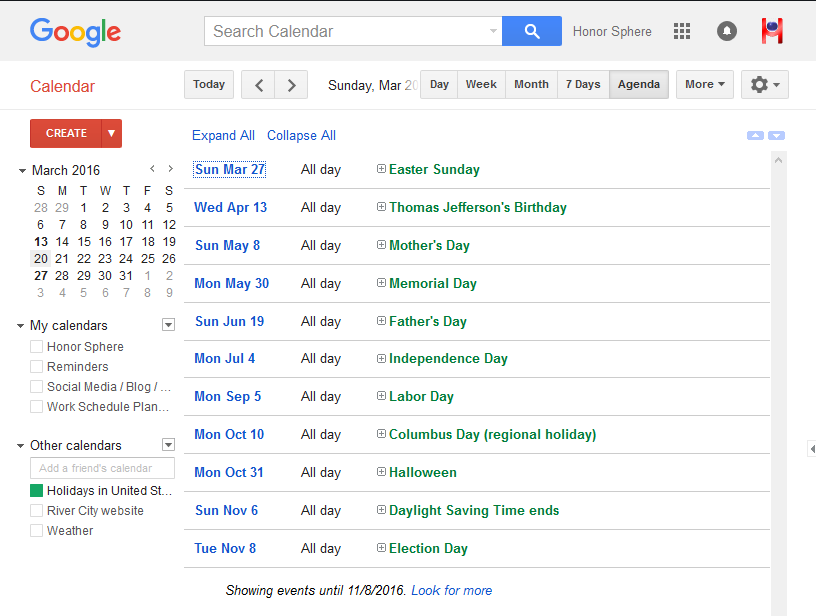
This is the new Google computer Calendar in the “Schedule” view”:

Google has perfected the usability of a calendar. They have “calendars” that you can turn on and off within a “main calendar”. In this way, you can write as much as you want on a “calendar”. Then you just turn on and off the “calendars” that you want to see on your “main calendar”. You can divide events into categories so you don’t have to see everything at once. You can have a “calendar” for:
- Birthdays
- Your Family’s Birthdays
- His Family’s Birthdays
- Friend’s Birthdays
- Birthday Parties
- Holidays
- Work Holidays
- Religious Holidays
- Family Events
- Office Events
- Store Sales Events
- Special Occasions
- Weddings
- Anniversaries
- Births
- Special Events
- Sports Events
- Attending
- Watching on TV
- Organizational Events
- Sports Events
- Business Meetings
- Writing Schedules
- Doctors Appointments
- School Meetings
- Children’s Schedules
- Bill Paying
- and this could go on forever …
Do you see why I have trouble using a wall calendar? Perhaps I just like lots of choices.
Turn Google “calendars” on and off. Make them public or private. Share them or don’t. Also, privacy has always been a big issue for me. Is anything that goes on the web private? Is anything in our lives private? Well, that’s another question for another day.
But wait, there’s more! Do you prefer a monthly view. I used to think that a calendar had to be monthly. Yet these “calendars” can switch between day, week, month, 7 days, or agenda. Now we’re talking planner, journal, and diary; even history. With the phone app, your laptop information follows you wherever you go.
Google also has a set of preset calendars that are just waiting for you to use. Browse Google’s Calendars of Interest. (You will need to sign into your Google account.)
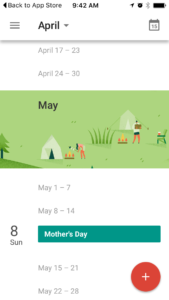
Facebook as a Calendar
Fast forward to Facebook. Is a selfie just a diary entry made to be as private or as public as we like? Every entry you make on Facebook is time-stamped. Is Facebook a journal, a diary, a historical record, or a scrapbook? You could use it any of those ways. Facebook even makes use of this capability by sharing things you did years ago with you. Makes you think more about what you might want to share today to be able to see it later.
You can also set up events. This is useful for live events when you want to invite your friends.
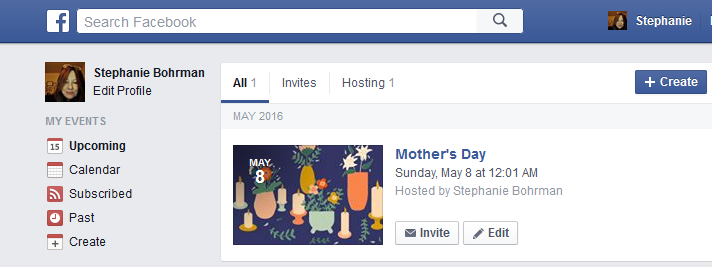
You can also view a calendar on Facebook. To get to this calendar, click “Events” on the left of your Personal News Feed. Then click “Calendar”. You can click on a date and “create” an Event for that day.
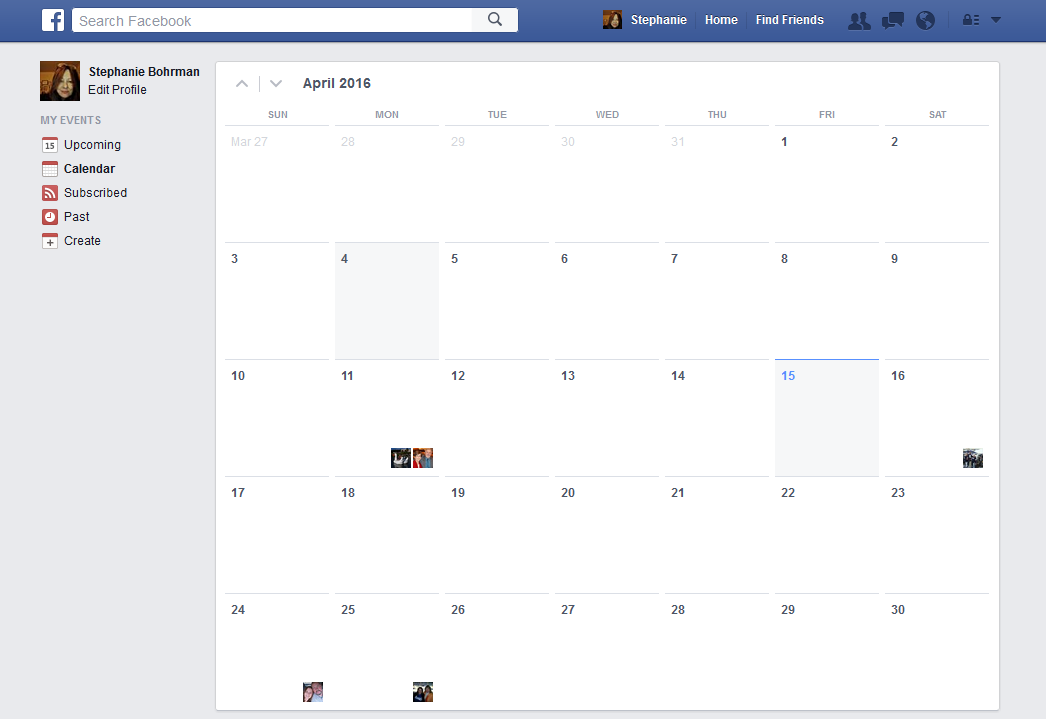
Facebook Pages can host events. The Mother’s Day Event below is a Mother’s Day Facebook Event.
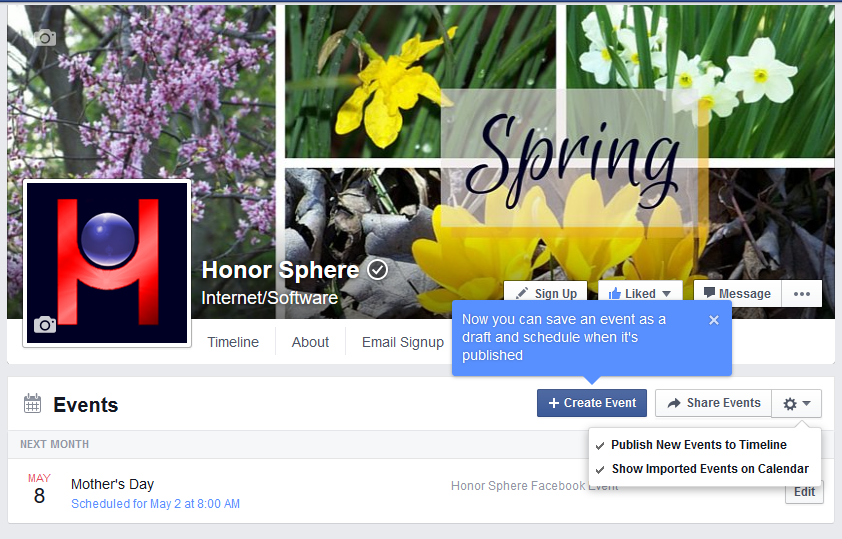
The Most Useful Calendar Links to Use for Years
Especially noteworthy for those who use the internet a lot, there are several websites that are just oozing with information for you to add to your calendars.
TimeandDate.com
Holidays and Observances around the World
Archives.gov
holidayinsights.com
Bizarre , Wacky and Unique Holidays
olympic.org
timeanddate.com
tn.gov (see individual states for license information)
espn.go.com
Old Farmers Almanac
Seed Starting and Planting Dates
Moon Phases and Lunar Calendar
Next Solar and Lunar Eclipse Dates
TV and Movies
Internet Movie Database (IMDb) – Movies Coming Soon
Live Events
What is the Ancient Truth About the First Calendars?
The National Institute of Standards and Technology (NIST) used the following statement as its opening about “Ancient Calendars”. The full article is in the Internet Archive WayBack Machine around 1908.
“Celestial bodies — the Sun, Moon, planets, and stars — have provided us a reference for measuring the passage of time throughout our existence. Ancient civilizations relied upon the apparent motion of these bodies through the sky to determine seasons, months, and years.” 1
Think! Is the Time-Tested Calendar Simplistic or Powerful?
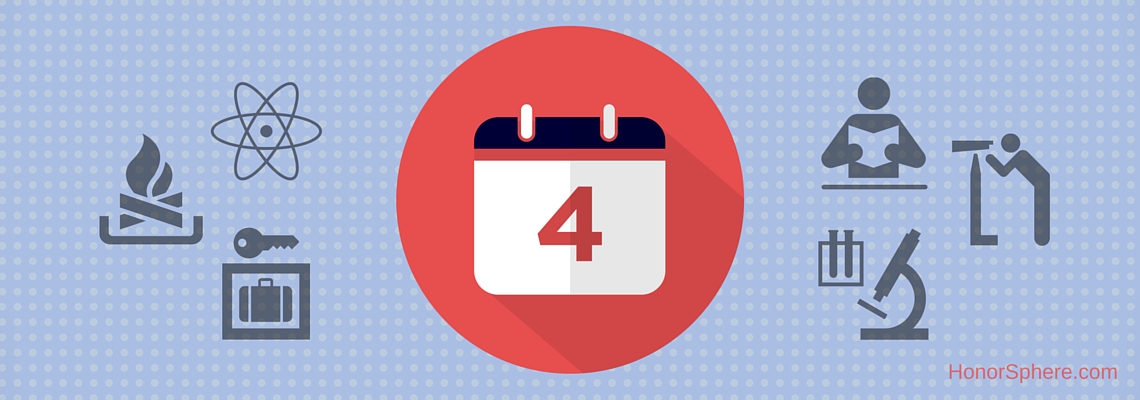
A more detailed explanation of calendars is in these two paragraphs from “Calendars and Their History” on a NASA website:
“A calendar is a system of organizing units of time for the purpose of reckoning time over extended periods. By convention, the day is the smallest calendrical unit of time; the measurement of fractions of a day is classified as timekeeping. The generality of this definition is due to the diversity of methods that have been used in creating calendars. Although some calendars replicate astronomical cycles according to fixed rules, others are based on abstract, perpetually repeating cycles of no astronomical significance. Some calendars are regulated by astronomical observations, some carefully and redundantly enumerate every unit, and some contain ambiguities and discontinuities. Some calendars are codified in written laws; others are transmitted by oral tradition.
The common theme of calendar making is the desire to organize units of time to satisfy the needs and preoccupations of society. In addition to serving practical purposes, the process of organization provides a sense, however illusory, of understanding and controlling time itself. Thus calendars serve as a link between mankind and the cosmos. It is little wonder that calendars have held a sacred status and have served as a source of social order and cultural identity. Calendars have provided the basis for planning agricultural, hunting, and migration cycles, for divination and prognostication, and for maintaining cycles of religious and civil events. Whatever their scientific sophistication, calendars must ultimately be judged as social contracts, not as scientific treatises.”2
Conclusion
In conclusion, that statement that “calendars…be judged as social contracts…” is quite an enlightening one. Are calendars, in fact, political instruments? The original source of this content, Explanatory Supplement to the Astronomical Almanac, by P. Kenneth Seidelmann, United States Naval Observatory, Nautical Almanac Office, Great Britain, Nautical Almanac Office, would be an interesting read.
But then again, do the people that control the calendar, in fact, control the world or at least a part of it? hmm!
Notes:
1National Institute of Standards and Technology. “Ancient Calendars.” Ancient Calendars. Accessed April 14, 2016. http://web.archive.org/web/20080409142829/http://physics.nist.gov/GenInt/Time/ancient.html. Found on the Internet Archive WayBack Machine

